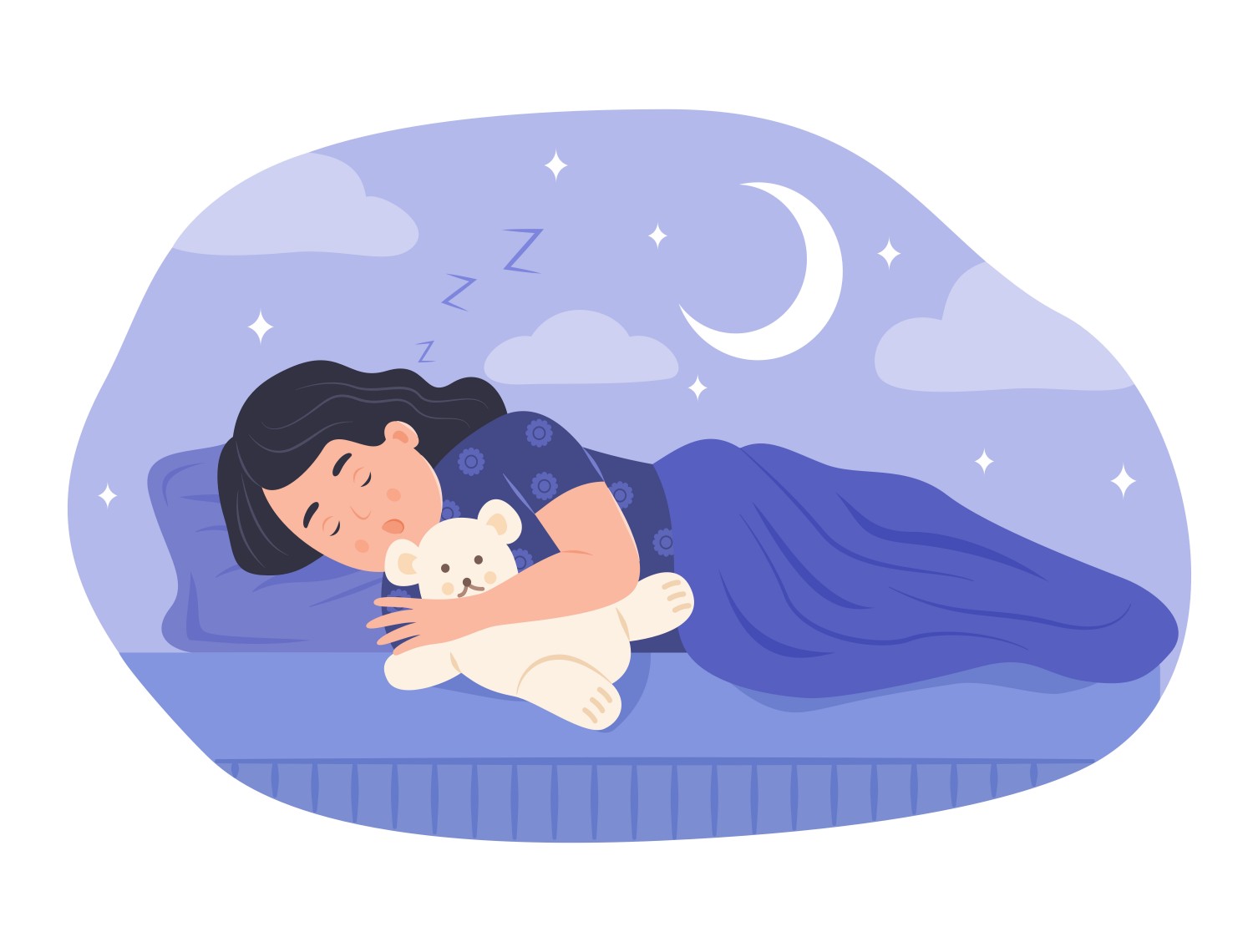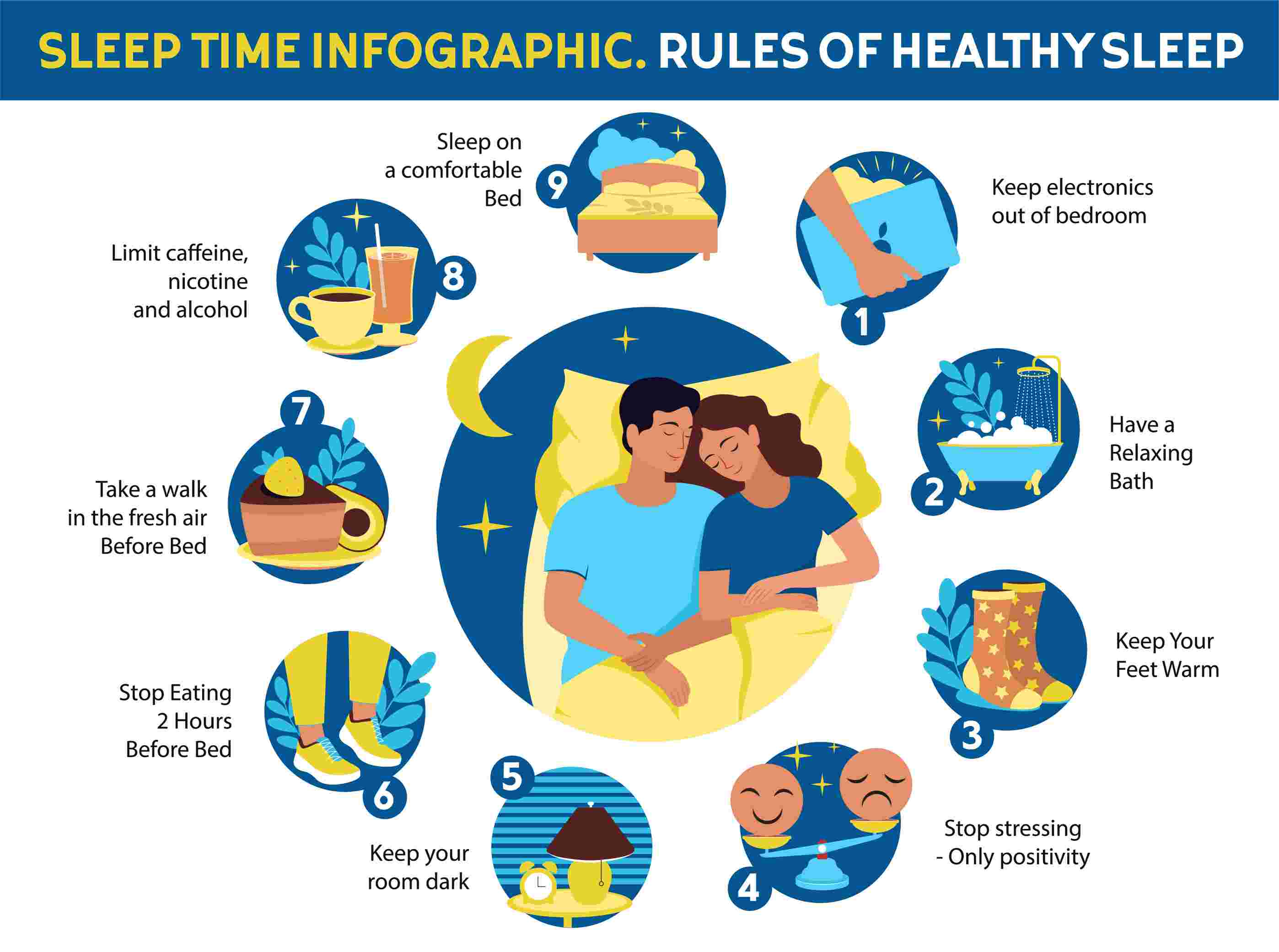
I. Sleep can relieve fatigue and restore energy. Good sleep plays an important role in maintaining physiological functions, promoting growth and development, and enhancing cognition and memory.
Sleep is a basic physiological function of human beings, affected by internal factors and the external environment, especially the circadian rhythm. Sleep can relieve fatigue and restore energy, and it is crucial for maintaining the stability of functions such as the nervous, cardiovascular, endocrine - metabolic, immune, and psychosocial systems. Good sleep can also promote growth and development and improve cognitive and memory abilities.
II. The required sleep duration varies among different age - groups and is also different from person to person. Good sleep is often manifested as feeling energetic and in a good mood after waking up.
An appropriate sleep duration is the foundation of healthy sleep. People of different age - groups have different requirements for sleep duration, and there are individual differences. Generally, infants aged 0 - 3 months need 13 - 18 hours of sleep per day, infants aged 4 - 11 months need 12 - 16 hours, toddlers aged 1 - 2 years need 11 - 14 hours, preschool children need 10 - 13 hours, primary and secondary school students need 8 - 10 hours, adults need 7 - 8 hours, and the elderly need 6 - 7 hours.
Good sleep quality is the key to healthy sleep. Good sleep quality is usually manifested as: falling asleep within 30 minutes (within 20 minutes for children under 6 years old); waking up no more than 3 times at night and being able to fall asleep again within 20 minutes; feeling energetic, in a good mood, full of energy, and focused after waking up.
Regular sleep time is the guarantee of healthy sleep. It is recommended to follow the seasons and maintain regular daily routines. Keep regular bedtime and wake - up times to maintain a stable biological rhythm. It is recommended that adults go to bed between 10 - 11 p.m. and get up between 6 - 7 a.m., and the elderly go to bed between 10 - 11 p.m. and get up between 5 - 6 a.m.
III. Long - term poor sleep can lead to slow reactions, decreased learning and work efficiency, and can also induce problems such as anxiety and depression, increasing the risk of infectious diseases, cardiovascular and cerebrovascular diseases, etc.
Poor sleep refers to insufficient or excessive sleep duration, decreased sleep quality, or disrupted sleep patterns. Common manifestations include reduced or extended sleep time, inability to fall asleep on time, difficulty falling asleep, early awakening, frequent waking up at night, light sleep with many dreams, and daytime sleepiness.
Long - term poor sleep can lead to slow reactions, decreased cognitive functions such as attention and memory, reduced learning and work efficiency, and even increase the risks of traffic and production safety; it can lead to emotional instability and restlessness, and in severe cases, it can induce anxiety, depression, etc.; it can reduce the body's immunity and increase the risk of infectious diseases, cardiovascular and cerebrovascular diseases, metabolic diseases, and cancer.
IV. Regular daily routines, a balance between work and rest, appropriate exercise, and a quiet and comfortable sleep environment are helpful for maintaining good sleep. Avoid staying up late, drinking alcohol or tea before bedtime, having a too full or too late dinner, and using mobile phones before bedtime.
Sleep is a complex physiological process that requires good living habits and a suitable sleep environment. Develop regular sleep times, maintain moderate physical exercise, avoid sitting for long periods, and get moderate sun exposure. The bedroom environment should be quiet and comfortable. Maintain an appropriate light intensity according to personal habits, with the indoor temperature between 20℃ - 24℃ and the air humidity between 40% - 60%. Open windows regularly for ventilation. The mattress should be relatively firm and not overly soft and sunken. The pillow should be of moderate height, and the bedding should be clean and dry. Using psychological counseling techniques such as mindfulness, relaxation training, and cognitive adjustment, taking a bath or soaking feet before bedtime, etc., are all helpful for sleep.
Staying up late, using electronic products for a long time before bedtime, having a too full or too late dinner, smoking, drinking alcohol, drinking tea or coffee before bedtime, and doing strenuous exercise for a long time before bedtime will all have a negative impact on sleep. In addition, factors such as age, genetics, emotions, stress, work style, diseases, and medications can also affect sleep.

V. Pay attention to groups such as children and adolescents, working - age people, and the elderly to improve sleep health throughout the life cycle.
Poor sleep in children is mainly manifested as insufficient or excessive sleep time, resistance to falling asleep, etc. Long - term poor sleep in children can affect physical growth, cognitive and emotional development, and in severe cases, it can lead to a series of behavioral problems and affect sleep habits in adulthood. Parents should help children develop good sleep habits. They can arrange pre - bedtime activities, such as washing, going to the toilet, telling stories, etc., with fixed and orderly activities, warm and moderate. Avoid over - excitement and strenuous exercise before bedtime, avoid eating hard - to - digest foods and overeating, and create a comfortable sleep environment. Cultivate the ability of young children to fall asleep alone. Do not rock or hug them to sleep, and separate feeding or eating from sleeping.
Poor sleep in adolescents is mainly related to academic pressure, the use of electronic devices, and irregular daily routines. Long - term poor sleep can affect learning ability, immunity, growth and development, etc., and may even lead to psychological and mental problems. Parents should provide a good growth environment for their children, help them relieve psychological pressure, understand their needs and troubles, give sufficient care and companionship, and provide correct guidance and education.
Working - age people often face problems such as high work pressure, fast - paced life, and irregular daily routines, which can easily lead to poor sleep quality, insufficient sleep time, and sleep inversion. Employers should create a healthy environment and conditions for workers. Working - age people should manage their working time properly, try to avoid staying up late, and prevent over - fatigue. Maintain moderate physical exercise and avoid sitting for long periods. Avoid smoking, drinking alcohol, drinking tea or coffee before bedtime, have a not - too - full or too - late dinner, and try not to use mobile phones before bedtime. Learn to relieve work pressure, keep a peaceful mind, and seek professional psychological counseling or treatment if necessary.
The elderly have a decreased ability to maintain sleep, and sleep disorders are more likely to occur. Sleep problems in the elderly are mainly manifested as shortened sleep time, difficulty falling asleep, light sleep and easy awakening, early awakening, etc. The elderly can improve their sleep by relieving negative emotions, improving the sleep environment, and developing good sleep habits. Maintain a reasonable sleep expectation, do not blame all problems on insomnia, do not pay too much attention to sleep, and do not feel anxious because of a bad night's sleep. Reduce the intake of beverages such as coffee and tea before bedtime, and avoid overeating or drinking too much water before bedtime. For primary diseases that affect sleep, early intervention and active treatment should be carried out.
VI. Sleep disorders are a group of sleep - related clinical syndromes characterized by difficulty falling asleep, difficulty maintaining sleep, excessive sleep, disordered sleep - wake cycles, or abnormal sleep behaviors. The most common ones are insomnia and obstructive sleep apnea - hypopnea syndrome.
Sleep disorders are a group of sleep - related clinical syndromes characterized by difficulty falling asleep, difficulty maintaining sleep, excessive sleep, disordered sleep - wake cycles, or abnormal sleep behaviors. They include more than 90 types of diseases in three major categories: "can't fall asleep", "can't wake up properly", and "can't sleep well", such as insomnia, obstructive sleep apnea - hypopnea syndrome, restless legs syndrome, narcolepsy, rapid eye movement sleep behavior disorder, sleepwalking disorder, sleep - wake rhythm disorder, etc. Among them, insomnia and obstructive sleep apnea - hypopnea syndrome are the most common.
Insomnia refers to a subjective experience in which, despite having suitable sleep opportunities and environment, a person is still not satisfied with the sleep duration and/or quality and this causes impairment of related daytime functions. Insomnia can exist alone or co - occur with mental disorders, physical diseases, or substance abuse. It is the most common sleep disorder. Obstructive sleep apnea - hypopnea syndrome refers to a disease in which the upper airway collapses during sleep, causing repeated apnea or hypopnea. It is mainly manifested by snoring during sleep and can cause damage to multiple systems throughout the body.
VII. Frequent occurrences of insomnia, daytime drowsiness, sleep - breathing disorders, irregular sleep patterns, and abnormal movements during sleep suggest the possibility of having a sleep disorder.
If there are frequent occurrences of difficulty falling asleep (taking more than 30 minutes to fall asleep, more than 20 minutes for children under 6 years old), waking up during sleep and being unable to fall asleep again, frequent daytime drowsiness, loud snoring at night with breathing pauses, irregular sleep patterns, and abnormal movements such as sleepwalking and bed - wetting during sleep, it suggests the possibility of having a sleep disorder. One should seek professional help from a medical institution in a timely manner.
VIII. If sleep problems have affected health and daily work and life, one should seek professional help from a medical institution as soon as possible. Different sleep disorders require different treatment methods.
When there are relatively serious sleep problems, it is recommended to consult the relevant specialties in the hospital in a timely manner. All types of sleep disorders can be treated and improved. The causes and mechanisms of different sleep disorders vary, and different treatment methods need to be adopted. Treatment methods such as adjusting diet, exercise, and daily routines, improving the sleep environment, regulating psychological pressure, as well as drug treatment, psychological treatment, and physical treatment can be used to promote healthy sleep. There are many methods of traditional Chinese medicine treatment for sleep disorders, such as decoctions of traditional Chinese medicine, patent traditional Chinese medicine, traditional Chinese medicine ointments, traditional Chinese medicine tea drinks, acupuncture, massage, ear - point treatment, aromatherapy, five - element music therapy, as well as dietary conditioning, emotional regulation, and guiding exercises. Treatment should be carried out according to the specific syndromes of the patients.
This article is collected from the Internet, if there is any infringement, please contact us to delete it.







Post comments